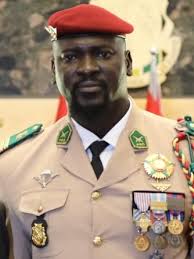 Few names in recent West African history have sparked widespread conversation as sharply as Mamady Doumbouya. One moment, he was a relatively little-known military officer; the next, he stood at the center of political upheaval. His rise to prominence, the motivations behind his actions, and the consequences of his leadership remain a source of fascination and debate. Whether you follow politics closely or are simply curious, understanding Mamady Doumbouyaoffers insight into larger questions of power, governance, and national identity.
Few names in recent West African history have sparked widespread conversation as sharply as Mamady Doumbouya. One moment, he was a relatively little-known military officer; the next, he stood at the center of political upheaval. His rise to prominence, the motivations behind his actions, and the consequences of his leadership remain a source of fascination and debate. Whether you follow politics closely or are simply curious, understanding Mamady Doumbouyaoffers insight into larger questions of power, governance, and national identity.
In this blog post, we unpack the story of Mamady Doumbouya—his background, key actions, leadership style, and what his emergence means for his country and the region. The language is clear and straightforward, designed for readers with diverse backgrounds. Let’s begin by stepping into the world that shaped this consequential figure.
Early Life and Military Roots of Mamady Doumbouya
Understanding Mamady Doumbouya begins with his early years. Born into a modest family, he joined the military as a young adult. His training was rigorous, and he showed a marked dedication to discipline and duty. Through steady advancement, he gained respect among peers and superiors alike.
His military career included specialized training and international exposure. He built a reputation for leadership in complex situations, especially in training and operations. This professional background shaped his worldview: a focus on structure, order, and decisive action—traits that would later define his leadership as a national figure.
The Turning Point: From Officer to Political Leader
What truly elevated Mamady Doumbouya into national prominence was a dramatic moment—one that captured global attention. On that day, he led a group of military officers in a bold move that upended the political landscape. The operation was swift and effective, routing the existing leadership and thrusting Doumbouya into the spotlight.
What motivated him? His public statements emphasized governance shortcomings: corruption, weak institutions, and economic struggles affecting ordinary citizens. His framing cast the move as corrective, meant to restore dignity and stability. Regardless of whether one agrees, the power play was clearly calculated and resolute.
Leadership Style and Public Reaction
Once in a position of authority, Mamady Doumbouya sought to shape his image. He adopted a disciplined, businesslike style. Public appearances often featured military-style protocol: crisp uniforms, orderly ceremonies, and precise messaging. The aim seemed to be projecting competence and unity.
Reactions were mixed. Supporters praised his decisiveness and vows to fight corruption and improve governance. Detractors worried about military overreach, erosion of democratic norms, and exclusionary decision-making. The contrast in public sentiment revealed the deep divide between hope for change and fear of regression.
Governing Priorities and Actions
Following the change in power, Mamady Doumbouya outlined several key priorities:
-
Institutional Reform
He pledged to reshape the judicial system and other foundational institutions to make them more independent and effective. -
Economic Stability
He aimed to address inflation, joblessness, and uneven growth through economic planning and investor confidence. -
Fighting Corruption
Anti-corruption rhetoric was central. He promised investigations, asset tracking, and accountability for public officials. -
Public Services
Observers noted announcements or plans targeting education, healthcare, and infrastructure—areas in critical need of revitalization.
The actual impact of these plans is still unfolding. Implementation requires resources, time, and institutional cooperation—all of which face real-world limitations in his context.
Regional and International Reactions
Outside his country, neighboring governments and regional bodies responded cautiously. Some expressed concern over military intervention in politics, citing democratic principles. Others hoped for stability and constructive engagement if Doumbouya’s leadership resulted in real reform.
International partners varied in tone—some held back on recognition until a clear roadmap emerged, while others indicated readiness to work if institutions remained open. The reality is that Mamady Doumbouya holds influence domestically, and external relations often reflect a balance between legal norms and practical diplomacy.
Challenges Ahead for Mamady Doumbouya
Looking forward, Mamady Doumbouya faces multiple hurdles:
-
Restoring Democratic Norms
Bringing back effective democratic structures—legislature, judiciary, elections—will be vital for legitimacy. -
Stabilizing the Economy
The economy may still struggle. Creating sustainable growth, jobs, and managing debt are crowded, urgent tasks. -
Institutional Trust
Building public trust requires consistency, transparency, and results—not just rhetoric. -
Military vs. Civil Authority
The role of the military in politics must be balanced to prevent undue dominance and ensure civilian-led governance. -
Regional Integration
Engagement with regional bodies must align with shared democratic ideals while enhancing cooperation.
The coming months and years will test whether Mamady Doumbouya can transition from a forceful actor to a transformative leader with enduring legitimacy.
Reflections on the Leadership of Mamady Doumbouya
-
Symbolism of a New Path
For some, Doumbouya represents a symbolic departure from the past—a reset button in leadership. -
Risks of Power Consolidation
Whenever the military plays a central role, concerns arise about unchecked power and erosion of democratic checks. -
Public Expectations
Citizens often expect quick fixes to deep-seated issues. Managing those expectations while delivering tangible progress is a challenge. -
Leadership Transition
Whether he willingly hands power back to civilians or becomes a long-term authority will be pivotal for national direction.
Mamady Doumbouya occupies a moment where history and leadership intersect. His choices now may shape the nation’s trajectory for years to come.